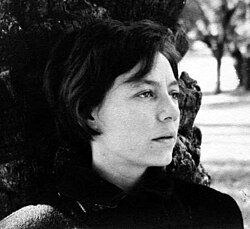Alejandra Pizarnik Quote
Related Quotes
They took one look at me,And hated my black face.They took one look at me,And decided on my fate.They took one look at me,And forced an unknown fear.They took one look at me,And caused the shed of tea...
N'Zuri Za Austin
Tags:
acknowledge, all lives matter, black lives matter, bleed, bleeding, blood, conflict, erase, faith, harmony
Her body accepted my brutal seed and took it to swell within, just as the patient earth accepts a falling fruit into its tender soil to cradle and nourish it to grow. Came a time, just springtime last...
Roman Payne
Tags:
babies, baby, blood, chidbirth, child, cradle, death, death and dying, death inspirational, dying
About Alejandra Pizarnik
Flora Alejandra Pizarnik (29 April 1936 – 25 September 1972) was an Argentine poet. Her idiosyncratic and thematically introspective poetry has been considered "one of the most unusual bodies of work in Latin American literature", and has been recognized and celebrated for its fixation on "the limitation of language, silence, the body, night, the nature of intimacy, madness, [and] death".
Pizarnik studied philosophy at the University of Buenos Aires and worked as a writer and a literary critic for several publishers and magazines. She lived in Paris between 1960 and 1964, where she translated authors such as Antonin Artaud, Henri Michaux, Aimé Césaire and Yves Bonnefoy. She also studied history of religion and French literature at the Sorbonne. Back in Buenos Aires, Pizarnik published three of her major works: Works and Nights, Extracting the Stone of Madness, and The Musical Hell as well as a prose work titled The Bloody Countess. In 1969 she received a Guggenheim Fellowship and later, in 1971, a Fulbright Fellowship.
On 25 September 1972, she died by suicide after ingesting an overdose of secobarbital. Her work has influenced generations of authors in Latin America.
Pizarnik studied philosophy at the University of Buenos Aires and worked as a writer and a literary critic for several publishers and magazines. She lived in Paris between 1960 and 1964, where she translated authors such as Antonin Artaud, Henri Michaux, Aimé Césaire and Yves Bonnefoy. She also studied history of religion and French literature at the Sorbonne. Back in Buenos Aires, Pizarnik published three of her major works: Works and Nights, Extracting the Stone of Madness, and The Musical Hell as well as a prose work titled The Bloody Countess. In 1969 she received a Guggenheim Fellowship and later, in 1971, a Fulbright Fellowship.
On 25 September 1972, she died by suicide after ingesting an overdose of secobarbital. Her work has influenced generations of authors in Latin America.
